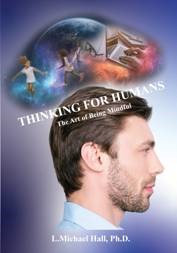In Neuro-Semantics, we have discovered thinking as the critical factor in all things human. We think and as we think, so we construct our mental maps of the world, our knowledge, our understandings, and our meanings. In thinking we invent beliefs which then govern our emotions, perceptions, and ways of acting. With thinking we even invent ourselves—our sesnse of self, our identities, roles, and who we are in the world.
We think because, unlike animals, we do not have information-instincts that tell us what to do, who to be, and how  to do things. Born not-knowing drives us to learn. And learn we do! What we then learn becomes our “instincts” or programs for how to be who and what we are. Nor is all of this thinking conscious, in fact, most of it is unconscious thinking. That explains why we are mostly unaware and out-of-touch with the thinking that we have done which has created our semantic or meaning world.
to do things. Born not-knowing drives us to learn. And learn we do! What we then learn becomes our “instincts” or programs for how to be who and what we are. Nor is all of this thinking conscious, in fact, most of it is unconscious thinking. That explains why we are mostly unaware and out-of-touch with the thinking that we have done which has created our semantic or meaning world.
The solution that we have developed in Neuro-Semantics is to think about our thinking, to learn not only what we are, and have been thinking, but the ability for how to think. Thinking is not just one thing, it is many things. Well, not “things,” but processes. You and I experience a wide range of kinds of thinking as well as thinking at multiple levels. Consequently there are scores and scores of thinking skills to learn and practice.
There are also scores and scores of dysfunctional thinking skills—we call them cognitive distortions, cognitive biases, cognitive fallacies. There are numerous so-called and seeming thinking skills which are actually non-thinking skills— reactive thinking, borrowed thinking, automatic thinking, superficial thinking, agenda thinking, certainty thinking, and expectations. When you don’t think well, nothing else will go well.
Given that schools teach what to think and not how to think, who today teaches people how to think? To address this question, we offer several things in Neuro-Semantics:
∙ The series of books on thinking.
∙ The trainings, we call them Brain Camps.
∙ The coaching by Meta-Coaches who specialize as thinking coaches.
∙ The Neuro-Semantic Reports that we have published on ‘The Shop.’
The Thinking Series — Books to make you an Excellent Thinker
∙ Executive Thinking (2018)
∙ Executive Deciding (2022)
∙ Executive Wisdom (2022)
∙ Executive Learning (2019)
∙ Hypnotic Thinking (2020)
∙ Humorous Thinking (2021)
∙ Metaphorical Thinking (2022)
∙ Predictive Thinking (2022)
∙ Thinking as a Modeler (2018)
∙ Figuring Out People (2005) — Thinking Patterns
∙ Movie Mind (2002): Representational Thinking
∙ Thinking for Humans (2024)
∙ The Deep Dive (2024) — Coach Thinking
∙ Meta Therapy (2022) — Therapeutic Thinking
The Trainings in Thinking —The Brain Camps
∙ Brain Camp I: Thinking for Humans
Training in the 15 thinking skills
∙ Brain Camp II: Executive Learning
Learning how to learn and think
∙ Brain Camp III: Executive Decision-Making
Learning meta-decisions for smart decisions
The 15 Thinking Skills
Each of the following set of skills is designed to achieve a specific outcome:
∙ Essential Thinking Skills— to ground your thinking in reality, make it real, authentic, accurate, specific, precise, and factual, the essence of critical thinking.
1) Considering — To try a Thought on, to keep your mind open
2) Questioning — To explore for understanding more fully
3) Doubting — To suspect, to play the skeptic
4) Detailing — To index or extensionalize into the real world
5) Distinguishing — To de-confuse, separate confusions
∙ Eureka Thinking Skills— to enable your thinking to generate new creative ideas that leads to innovations, insights and higher level understandings.
6) Inferring / Inferential thinking — To infer what’s implied
7) Organizing / Organizational thinking — To organize your thoughts
8) Creating / Creative thinking — To create new ideas and solutions
9) Metaphorical thinking — To use effective comparisons
10) Synergistic (or Systemic) thinking — To see the whole system
∙ Executive Thinking Skills— to let your thinking perform the executive funcitons of the prefrontal cortex, establishing learnings, decisions, intentions, reflexivity, sense of self, sense of the future, and being-cognition.
11) Learning — To draw effective conclusions
12) Deciding (Intending, Choosing) — To make smart decisions
13) Discerning (Wisdom) — To discern distinctions
14) Reflexivity — To use meta-thinking to manage your thoughts
15) Sacralizing (Being-cognition) — To be mindful and see the sacred in life
One-on-one with a Thinking Coach
While Meta-Coaches are training to do many things—one of the central things they can do is to be a Thinking Coach to people. Meta-Coaches are now in 73 countries so if you want a one-on-one with a Thinking Coach, click on the following to find a Meta-Coach in your country: https://www.neurosemantics.com/find-a-neuro-semantic-institute/
Neuro-Semantic Reports on ‘The Shop’
∙ Brain 101
∙ How to be a Professional Communicator
∙ Mastering Cognitive Distortions
∙ Neuro-Semantic Report on Attitudes
∙ Neuro-Semantics on Facts
∙ Neuro-Semantic Report on Emotions
∙ Neuro-Semantics on Learning
∙ Neuro-Semantics of Mindfulness
∙ Neuro-Semantics of Resilience
∙ Neuro-Semantics on Responsibility To/For
∙ Neuro-Semantics on Healthy Aging
∙ Neuro-Semantics on Critical Thinking
∙ Neuro-Semantics on Politics
∙ Parenting 101 Handbook
∙ The Fight Right Process
∙ The Bateson Report
